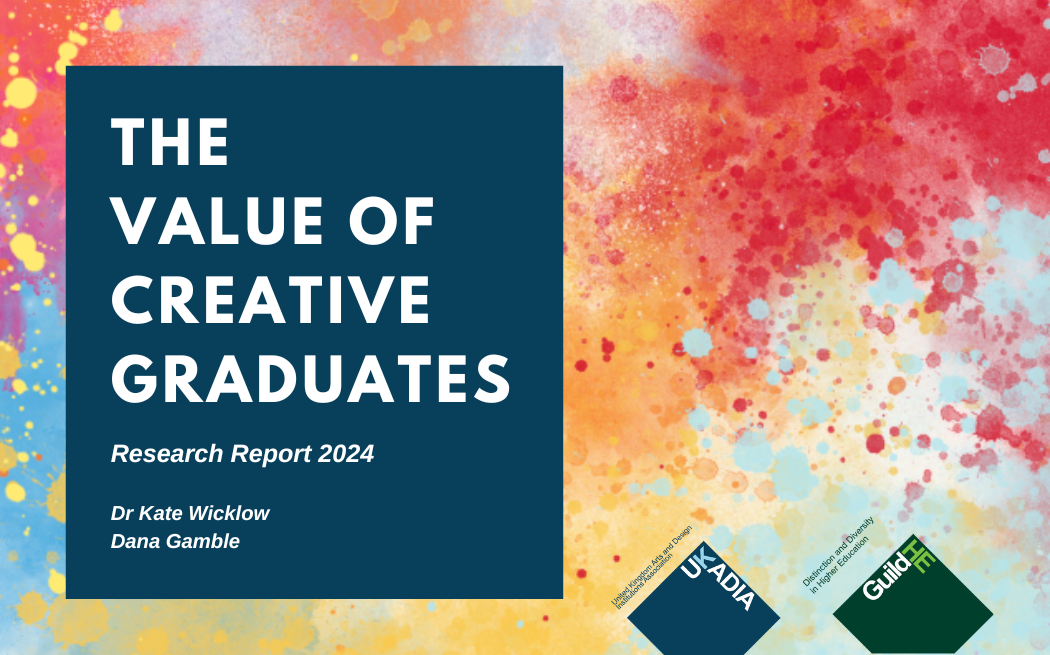GuildHE and UKADIA, with a steering group of creative specialist higher education providers and Creative UK, have published an important new report ‘The Value of Creative Graduates’.
In a blog for GuildHE, Lisa Mann, Executive Director of Innovation at Arts University Bournemouth, Chair of the Steering Group and representing UKADIA explains how the report addresses the challenges of defining creative graduates’ value and the essential next steps for higher education providers, business and industry, government and regulators to realign that perception.
Over the last 15 years, creative education has felt under attack. Multiple government interventions have tried to de-value creative education, simply because not all creative graduate roles command high salaries. The creative industries are a vital sector for our economy and the health and wellbeing of our nation. Furthermore, evidence shows that creative skills are valued by employers outside the creative industries; creative and design thinking is increasingly being utilised to solve a broad range of complex real-world problems.
GuildHE and UKADIA, led by a steering group of creative specialist HE providers and Creative UK, have therefore come together to investigate this issue and publish a report that addresses the challenge of defining the value of creative graduates. In it, we set out the unique impact of creative degrees and creative pedagogy and evidence the significant contribution specialist creative institutions make to their regions, both culturally and economically. We also describe the complex nature of the creative industries work system including the fact that many creative graduates aim for self-employment, portfolio careers, freelancing, and entrepreneurial endeavours, which is in part why data on graduate outcomes is not representative of the true economic value of creative graduates to a range of sectors. This report provides many tangible examples and case studies that evidence how higher education institutions, their students and graduates substantially contribute regionally and nationally, to the economy, and societal health and wellbeing.
Creative higher education is different from that of many other subject disciplines. Applied thinking and public/industry engagement are fundamental to teaching and learning – with live briefs set by businesses, work experience, artistic showcases and innovative real-world problem-solving often being embedded in the curriculum and/or assessment. Creative graduates not only grow their creative talents and passions on creative courses, they also develop specialist and highly valuable professional and transferable skills that service all sectors and to communicate their impact and value.
Furthermore, the arts provide a mechanism through which it is possible to improve equality of opportunity. In the higher education sector evidence indicates a significant concentration of students with disabilities choosing to study creative disciplines. 24% of students in specialist creative institutions declare a disability, compared to 15.7% of the student body overall; in 14 specialist HEIs this number is more than 30%. Creative courses offer a valuable pathway for disabled students to be empowered and academically thrive. Evidence from the Cultural Learning Alliance also indicates that creative education in schools improves the lives of those from low-income families and young offenders, as well as improving educational attainment (including in Maths and English) and employment outcomes for all students. That’s why we are a founding partner of the #ArtIsEssential Creative Education Manifesto which has brought together education providers and the creative sector to call for the protection of the creative arts talent pipeline from school, into higher education and then onto our pioneering creative industries.
Whilst we have battled misconceptions and negative rhetoric around the value of creative education and skills, there is always more we can do to improve our understanding and measurement of value. We have therefore developed a series of recommendations for the higher education sector, businesses and government to encourage the realignment of the perception of the value of creative graduates and ensure there is equality of access and opportunity for individuals to develop their creative skills and choose a creative career. These include asking the government and regulators to rethink the current ‘value’ measures of graduates, such as highly skilled and salary metrics; asking non-creative industries to better articulate the value of creative skills to their productivity, growth and innovation activities; better careers IAG and alumni tracking; and ensuring sustainable funding models for specialist creative providers to protect the diversity of the globally-valued UK higher education sector.
The incoming government has made a commitment through the Labour Party’s Sector Deal and Labour Creatives work to support the development of creative skills and harness them to support national growth. We hope this report is a useful resource in bringing together the evidence base for the value of creative graduates, and look forward to working with the ministerial team in both DfE and DCMS.

